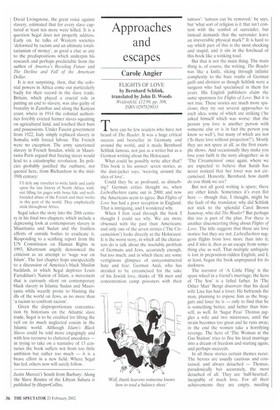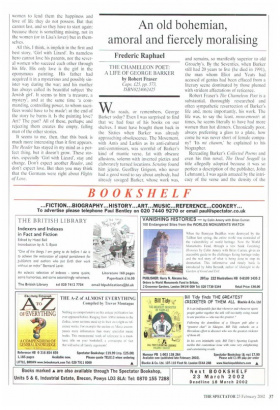Approaches and escapes
Carole Angier
FLIGHTS OF LOVE by Bernhard Schlink, translated by John D. Woods Weidenfeld, £12.99, pp. 308, ISBN 0297829033 There can be few readers who have not heard of The Reader. It was a huge critical success and bestseller in Germany and around the world, and it made Bernhard Schlink famous, not just as a writer but as a German writing about the Holocaust.
What could he possibly write after that? This book is his answer: seven stories, as the dust-jacket says, 'weaving around the idea of love'.
Could they be as profound, as disturbing? German critics thought so, when Liebesfluchten came out in 2000; and now the Americans seem to agree. But Flights of Love has had a poor reception in England. That is intriguing, and I wondered why.
When I first read through the book I thought 1 could see why. We are more obsessed with the past than Americans; and only one of the seven stories (The Circumcision') looks directly at the Holocaust. It is the worst story, in which all the characters do is talk about the insoluble problem of Germans and Jews, accurately enough, but too much; and in which there are some vertiginous glimpses of unreconstructed hate and fear. German Andi, who has decided to be circumcised for the sake of his Jewish love, thinks of 'SS men and concentration camp prisoners with their tattoos': 'tattoos can be removed,' he says, but 'what sort of religion is it that isn't content with the symbol of surrender, but instead demands that the surrender leave an irreversible physical mark?' It is hard to say which part of this is the most shocking and stupid; and it sits in the forehead of this book like a winking toad.
But that is not the main thing. The main thing is, of course, the writing. The Reader was like a knife, slicing through infinite complexity to the bare truths of German guilt and division as though Schlink were a surgeon who had specialised in them for years. His English publishers claim the same spareness for Flights of Love. But it is not true. These stories are much more spacious; they try out several approaches to each idea, some of which are striking (he asked himself which was worse: that the person you love is another person with someone else or is in fact the person you know so well'), but many of which are not (Is there love without projection?'). Mostly they are not spare at all, as the first example shows. And occasionally they make you lose your faith in the story altogether: as in 'The Circumcision' once again, where we are expected to believe that Sarah has never noticed that her lover was not circumcised. Honestly, Bernhard, how dumb do you think we are?
But not all good writing is spare; there are other kinds. Sometimes it's even flat here — though that, I thought, might be the fault of the translator; why did Schlink not stick to the splendid Carol Brown Janeway, who did The Reader? But perhaps this too is part of the plan. For there is another disconcerting thing about Flights of Love. The title suggests that these are love stories: but they are not. Liebesfluchten suggests flights from love more than into it; and if into it, then as an escape from something else as well. That multiple ambiguity is lost in preposition-ridden English; and I, at least, began the book unprepared for its darkness.
The narrator of 'A Little Fling' is the spare wheel in a friend's marriage; the hero of 'The Son' is a failed father. In The Other Man' Bengt discovers that his dead wife Lisa has had a lover. He befriends the man, planning to expose him as the braggart and loser he is — only to find that he is something better, and better than himself, as well. In 'Sugar Peas' Thomas juggles a wife and two mistresses, until the strain becomes too great and he runs away; in the end the women take a horrifying revenge. The hero of The Woman at the Gas Station' tries to flee his tired marriage into a dream of freedom and starting again, and perhaps succeeds.
In all these stories certain themes recur. The heroes are usually cautious and contained, and always detached — Thomas, paradoxically but accurately, the most detached of all. They are 'half-hearted', incapable of much love. For all their achievements they are empty, needing women to lend them the happiness and love of life they do not possess. But that cannot last, and so they have to start again: because there is something missing, not in the women (or in Lisa's lover) but in themselves.
All this, [think, is implicit in the first and best story, 'Girl with Lizard'. Its nameless hero cannot love his parents, nor the several women who succeed each other through his life. His only love is the girl in the eponymous painting. His father had acquired it in a mysterious and possibly sinister way during the war; and his mother has always called its beautiful subject 'the Jewish girl'. It seems to him 'a treasure, a mystery', and at the same time 'a commanding, controlling power, to whom sacrifices would have to be made'; at the end of the story he burns it. Is the painting love? Art'? The past? All of these, perhaps; and rejecting them creates the empty, falling man of the other stories.
It seems to me, then, that this book is much more interesting than it first appears. The Reader has stayed in my mind as a perfect thing, but it doesn't grow. These stories. especially 'Girl with Lizard', stay and change. Don't expect another Reader, and don't expect love. But then you may think that the Germans were right about Flights of Love.







































































 Previous page
Previous page